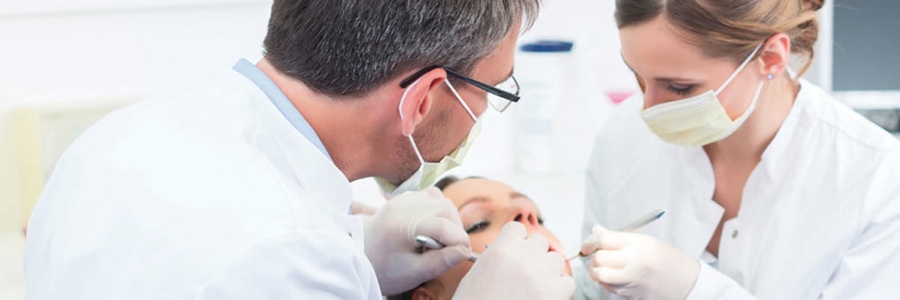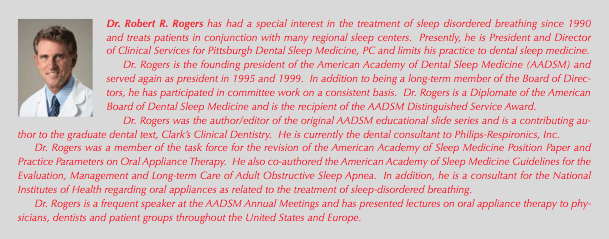
by Robert R Rogers, DMD, DABDSM
This is a particularly exciting time to be involved in dental sleep medicine. We have as they say, reached critical mass. To a meaningful extent we have shown that the concept of oral appliance therapy is legitimate and effective. Most physicians understand this. Most insurance companies recognize this. Many dentists are competent and treating patients effectively.
Having been involved in this nascent field from the beginning, I can tell you this was not always so. Twenty-five years ago the original pioneers attempted to render therapy with oral appliances having no real support in the published literature. Because of this and the lack of established medical protocol our medical colleagues could not comfortably accept us as team members. And looking back, we had neither the competency nor the effective appliance technology to assume we should be.
 Nonetheless, we slowly and surely fought on. We organized an academy and began to work closely with physicians to gradually move forward to where we are today. Without this partnership, it is doubtful that we would enjoy the credible recognition we do today
Nonetheless, we slowly and surely fought on. We organized an academy and began to work closely with physicians to gradually move forward to where we are today. Without this partnership, it is doubtful that we would enjoy the credible recognition we do today
However, the game is not over. In fact, it is really just beginning. As dental sleep medicine evolves still further, challenges remain. The vast majority of the patients who could truly benefit from oral appliance therapy are not being referred to us. Why is that? What should we do about it? Will insurance carriers consider oral appliance therapy as a first-line treatment and reimburse us reasonably? Will they impose restrictive regulation? What determines the insurance carrier’s attitude in this regard? Can we do anything about it?
Traditional consensus holds that dentists can treat but not diagnose obstructive sleep apnea. This notion is being intensely scrutinized these days – as well it should be. The American Dental Association and state dental laws define the practice of dentistry in very broad terms. Might this open the door for us to diagnose and have unfettered access to more patients? After all, we are “doctors” and many of us feel we have a good background in sleep medicine and can render oral appliance therapy with little or no guidance from our medical colleagues. Is this the answer to our dilemma? In reality, this is not the right question to ask. More importantly, we should discern what the consequences would be if we adopted this approach. How would this affect the landscape in which we work? How would physicians react? Does it matter?
 Obstructive sleep apnea is a medical problem and so physicians are therefore the major player in the scheme of things. (Yes, the mandible is an important ingredient in the recipe of creating and maintaining a patent airway during sleep, but fundamentally OSA is a medical issue, not a dental one.) By upsetting our partnership with physicians and beginning to diagnose OSA from purely a dental perspective, we will be seen as dissolving the ties that have served us well in the past. Why should physicians be upset by this? I am reminded of the situation years ago when dental hygienists were keen on setting up independent hygiene practices without any oversight from licensed dentists. It made abundant sense to the hygienists since they are duly licensed to practice hygiene and have been doing so successfully for many years. We as dentists, however felt differently and fought tooth and nail against it. Is it so hard to imagine why physicians might feel uncomfortable if we begin treating obstructive sleep apnea with little or no guidance from them? Are we really being treated as second-class practitioners or do we labor under an inflated opinion of ourselves? So the question really becomes not whether we can diagnose OSA but rather, should we? What will we get and what will it cost us?
Obstructive sleep apnea is a medical problem and so physicians are therefore the major player in the scheme of things. (Yes, the mandible is an important ingredient in the recipe of creating and maintaining a patent airway during sleep, but fundamentally OSA is a medical issue, not a dental one.) By upsetting our partnership with physicians and beginning to diagnose OSA from purely a dental perspective, we will be seen as dissolving the ties that have served us well in the past. Why should physicians be upset by this? I am reminded of the situation years ago when dental hygienists were keen on setting up independent hygiene practices without any oversight from licensed dentists. It made abundant sense to the hygienists since they are duly licensed to practice hygiene and have been doing so successfully for many years. We as dentists, however felt differently and fought tooth and nail against it. Is it so hard to imagine why physicians might feel uncomfortable if we begin treating obstructive sleep apnea with little or no guidance from them? Are we really being treated as second-class practitioners or do we labor under an inflated opinion of ourselves? So the question really becomes not whether we can diagnose OSA but rather, should we? What will we get and what will it cost us?
 From a legal perspective, it may be within our scope of practice to diagnose OSA. Recently, some competent dental/legal minds have put forth strong arguments that this is so. Even if it is, a prudent practitioner should wonder if it is defensible in court. Can a dentist satisfy the standard of care as it presently appears in the published literature? The most notable organizations that have addressed standard of care issues indicate that diagnosis of OSA should be made by a physician. Whether or not this is right or wrong is immaterial. Perhaps subject to change in the future, it is in fact reality at this point in time.
From a legal perspective, it may be within our scope of practice to diagnose OSA. Recently, some competent dental/legal minds have put forth strong arguments that this is so. Even if it is, a prudent practitioner should wonder if it is defensible in court. Can a dentist satisfy the standard of care as it presently appears in the published literature? The most notable organizations that have addressed standard of care issues indicate that diagnosis of OSA should be made by a physician. Whether or not this is right or wrong is immaterial. Perhaps subject to change in the future, it is in fact reality at this point in time.
Sleep-disorders dentists are incredibly important players in the treatment mix of obstructive sleep apnea. It is ludicrous to imagine that a medical team could function effectively without a dentist on board. As such, we should evolve into a position of shouldering more responsibility and having more autonomy for the treatment of our patients. And we should be afforded smoother access to the many people who need our services. However, as dental sleep medicine experiences these natural growing pains, it will serve us best to consider all our options and the consequences of our actions. Simply succumbing to the loudest voices on social media threads may be less than productive in the long run.
The other major player in the treatment of obstructive sleep apnea is the insurance industry. They, after all, control the flow of money. (Yes, certain practices presently exist with a purely fee-for-service scenario but these are few and far between and will shrink into near nothing in the coming years.) As dentists, we are passionate about “running the show” and take great exception when anyone attempts to impinge on our autonomy. Like it or not, the practice of dental sleep medicine is heavily dependent on insurance participation. This is medicine with a dental spin not dentistry with a medical spin.
 Our reaction to contemporary issues will not only influence how our medical colleagues relate to us but will also reverberate throughout the insurance industry. Third-party insurers are intimately concerned with a number of issues that our behavior impacts. They need to know that their patients are well cared for and that their money is well spent. We have seen over the years that when competent dentists render proper care following established medical protocol, most insurance companies will indeed pay us somewhat reasonably. Recently however, the insurance carriers are becoming a little skittish due to the nature and increasing number of claims submitted by dentists. The sheer magnitude of claims being submitted is increasing exponentially. On the surface, there is nothing wrong with this. Unfortunately, in conversation with Medicare and other insurers, some claims appear to employ fraudulent coding and are requesting inappropriately high fees. In addition, healthcare attorneys inform me that companies are springing up that appear to focus on gaming the system through creative, quasi-legal manipulation. The insurance industry is very savvy and they are critically aware of this. It has happened in the past many times in medicine and they know how to deal with it. They reduce fees and institute more and more regulation. It can be argued that much of that is our own fault.
Our reaction to contemporary issues will not only influence how our medical colleagues relate to us but will also reverberate throughout the insurance industry. Third-party insurers are intimately concerned with a number of issues that our behavior impacts. They need to know that their patients are well cared for and that their money is well spent. We have seen over the years that when competent dentists render proper care following established medical protocol, most insurance companies will indeed pay us somewhat reasonably. Recently however, the insurance carriers are becoming a little skittish due to the nature and increasing number of claims submitted by dentists. The sheer magnitude of claims being submitted is increasing exponentially. On the surface, there is nothing wrong with this. Unfortunately, in conversation with Medicare and other insurers, some claims appear to employ fraudulent coding and are requesting inappropriately high fees. In addition, healthcare attorneys inform me that companies are springing up that appear to focus on gaming the system through creative, quasi-legal manipulation. The insurance industry is very savvy and they are critically aware of this. It has happened in the past many times in medicine and they know how to deal with it. They reduce fees and institute more and more regulation. It can be argued that much of that is our own fault.
After 25 years, dental sleep medicine is just now entering its adolescence and feels a little off balance as it grows up. Let’s make sure we keep our eyes on the road and our feet on the ground so we can claim our rightful place on the medical team.
Stay Relevant With Dental Sleep Practice
Join our email list for CE courses and webinars, articles and more..




